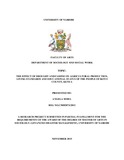| dc.description.abstract | The study examined the effects of drought and famine on agricultural production, living standards and educational status of the people of Kitui County and also the control measures adopted by the community in curbing drought and famine. The study is meant to add knowledge on the understanding of how prepared and resilient rural communities are in response to drought and famine. The study was conducted in Ikutha, Mutomo and Lower Yatta districts of Kitui County. The site was chosen because it is a semi-arid area with a large number of small-scale agro-pastoralists and has been affected by drought and famine for over a period of 30 years. However, many efforts have been made by the government and both local and international NGOs to assist the communities cope with famine and drought.
The design of this research was descriptive research design. The study used simple random sampling to select a sample of 150 respondents, who provided the relevant data for the study as they have experienced drought and famine in the area and have seen the resilience measures adopted to curb the impact of drought and famine. The quantitative data was collected from households and analyzed using a Statistical Package for Social Sciences (SPSS) while qualitative was by use of focus group discussions and key informant interviews and was analyzed using content analysis.
The study concluded that failure to involve all stakeholders in responding to drought has been a major challenge. Community participation, resilience and preparedness in drought has been ignored and emphasis has been on emergency relief and response. The affected communities have also become too weak when drought strikes and unilateral declaration by project administrators without listening to people‟s responses which would involve communities has also been a challenge. Failure to implement the recommendations made has also been a major challenge. On the success there has been building of boreholes which has increased access to water for the community. Irrigation has also been implemented and conservation of the environment has also been implemented. The study also concluded that various organizations have supported the community in coping with drought through various measures such as conducting forums and sensitizing the locals on the need of conserving the environment through planting of trees and eliminating deforestation which is a major cause of drought. Various organizations have built boreholes for the locals to increase the water content for the community. In coping with drought the residents have been empowered to grow drought resistant crops which can cope under harsh weather conditions.
The study recommends that the community in Kitui County should be encouraged to diversify their income generating activities. The study also recommends that the residents in Kitui County be encouraged to grow drought resistant crops such as sorghum and millet. The community should be educated on the importance of trees to the environment to reduce tree` cutting firewood. The government should encourage parents on the importance of education. Education will provide opportunities in the future for their children. Promote formation of local rural institutions and farmer groups. This will help in educating farmers on fertilizers, seed varieties, crop diversification and also livelihood diversification, development of community drought early
warning systems. | en_US |

